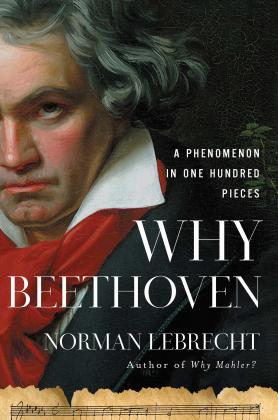
| Format | Hardcover |
| Publication Date | 05/02/23 |
| ISBN | 9781639364114 |
| Trim Size / Pages | 6 x 9 in / 352 |
Without Beethoven, music as we know it wouldn’t exist. By examining one hundred of his compositions, a portrait emerges of the man behind the music.
Lebrecht has immersed himself in the rich catalogue of Beethoven recordings and presents a unique picture of the man through his music. He selects the best recordings of one hundred key pieces, showing the composer as we’ve never seen him before. Unruly, offensive, and hopeless in so much of his life, yet driven to a fault and devoted to his art, conquering deafness to pen masterpieces.
Norman Lebrecht, has been grappling with this icon at the heart of music for his entire life. Who was the irascible, unpredictable, warped genius who stretched what music could do to the breaking point?
In this unique examination, Lebrecht attempts to understand the power of this man through his compositions, the history of who has performed them, and what it has meant to successive generations of audiences. In turn a detective story (we learn who Elise of “Fur Elise” is for the first time) and a confession, Why Beethoven aims to rise to the challenge of how to encompass the relentless energy of this singular genius.
With a narrative that mirrors the wayward sequence of Beethoven’s compositions, Beethoven emerges as a cornerstone of the world as we know it.
Norman Lebrecht is the author of twelve works of non-fiction, including the international bestsellers The Maestro Myth, Why Mahler? and The Life and Death of Classical Music, which have been translated into seventeen languages. His first novel, The Song of Names, won a Whitbread Award and is now an award-winning film. He writes for the Spectator and the Wall Street Journal, and is working on his fourth novel. He lives in London. Follow him at @NLebrecht and visit normanlebrecht.com.
Buy it now in print:
Buy it now in ebook:
"Mr. Lebrecht’s reflections are as predictable as Beethoven’s music: which is to say, not at all. His chapter on the 'Kreutzer' violin sonata, one of the great chamber works of Western music, should earn him the gratitude of classical musicians everywhere.”
Wall Street Journal
"Why Beethoven is a provocatively illuminating, occasionally scandalous survey of the recordings that shaped Beethoven's life. It makes for an exhilarating narrative that in its wake also raises several divisive cultural issues." Strings Magazine
"A simultaneously entertaining and informative tour of Beethoven’s work...An ideal guide to the master’s wondrous achievements."
Kirkus, starred review
"One heck of an enjoyable read." BBC Music Magazine
"Norman Lebrecht has given us a lambent summing up of his adventures with Beethoven, deeply personal yet grounded in music that we know and love” Tim Page, winner of the 1997 Pulitzer Prize for his music criticism in the Washington Post
"An incredibly fascinating personal search for Beethoven's personality, his legacies and relevance. Lots of details and facts were new to me; many of the chapters provoked me to think even further, beyond the music and philosophy of this titan." Vasily Petrenko, Music Director of the Royal Philharmonic Orchestra
"Norman Lebrecht, in his remarkable book, shows that Beethoven has as much relevance as he always had – maybe even more in these crazy times." Franz Welser-Möst, Music Director of the Cleveland Orchestra
"From one of our most prolific and wide-ranging writers on music, here is a connoisseur’s guide to Beethoven recordings fleshed out with vivid bits of biography and memoir." Jan Swafford, author of Beethoven: Anguish and Triumph
"Lebrecht demonstrates that language need not end where music begins. Illuminating and uplifting." Gabriela Montero, pianist and composer
"Norman Lebrecht has turned his attention to Beethoven, and in a way that no one has done before. Lebrecht has had the idea of taking 100 pieces, briefly describing their origins and character, and then critically examining, and recommending, recordings of them. You want to build a Beethoven library? There can be no better starting point. You want to expand your existing collection? This book is for you. Not just the familiar works — symphonies and piano concertos — but lesser known chamber pieces, and even songs and musical quips. Not many Beethoven books tell you about the 30-second musical joke ‘Schuppanzigh ist ein Lump’. Lebrecht does. Few chapters are more than a couple of pages long. Bite-sized Beethoven. Brilliant idea." John Suchet, Classic FM presenter